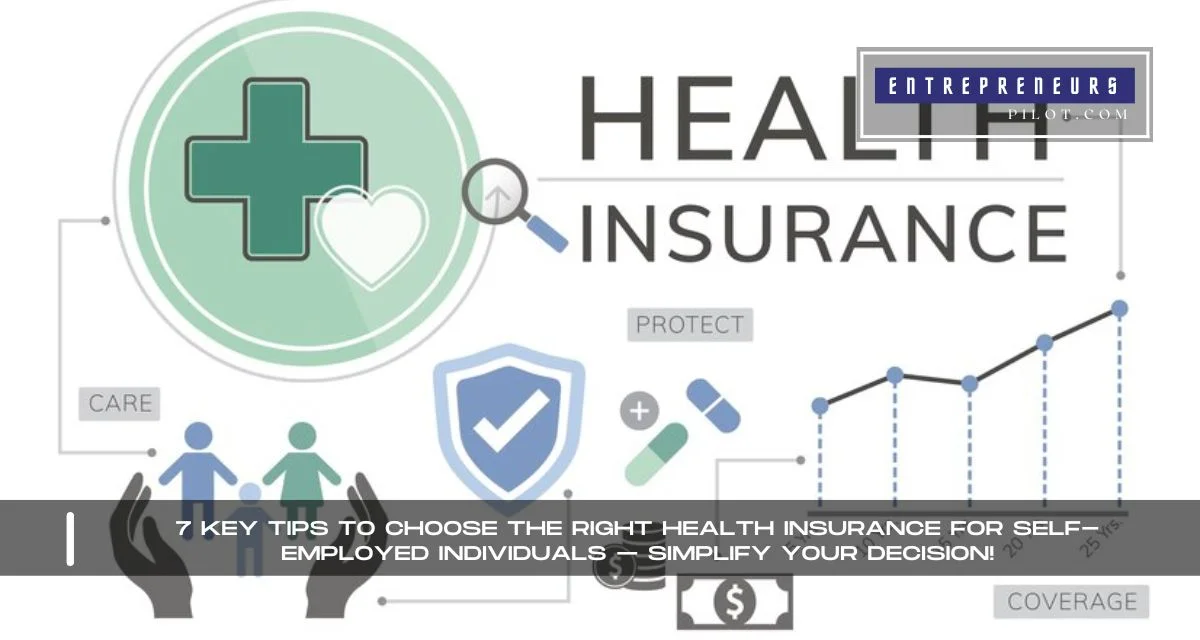Introduction
Navigating the world of health insurance can be especially challenging for self-employed individuals. With no employer-sponsored plan to fall back on, finding the right coverage becomes a critical decision. This is where understanding the intricacies of Health Insurance For Self-Employed Individuals becomes crucial. In this article, we provide you with seven key tips to simplify your decision-making process.
From assessing your health needs to understanding policy nuances, these insights are tailored to help self-employed professionals make informed choices in securing their health and financial well-being. Let’s dive into these essential tips to help you choose the best health insurance plan that caters to your unique situation.
Table of Contents
1. Evaluate Your Health Needs
Start by assessing your individual health needs. Consider your current health status, any ongoing treatments, and potential future medical needs. This assessment will guide you in finding a plan that covers your specific health requirements without overpaying for unnecessary benefits.
2. Understand Different Plan Types
Familiarize yourself with different types of health insurance plans, such as HMOs, PPOs, EPOs, and HSAs. Each type offers varying levels of coverage, flexibility, and costs. Understanding these differences is key to choosing a plan that aligns with your healthcare preferences and budget.
- For Expert Financial Insights And Guidance, You Can Visit Our Sister Site – ArabsGeek.com Now!
- Curiosity Piqued? Dive Into the Most Captivating Financial Content by Visiting Our Homepage!
- Unlock Exclusive Business Opportunities! 🚀 Connect with Us Now at our Email: [email protected]!
3. Compare Coverage and Costs
Carefully compare the coverage details and costs of various plans. Pay attention to premiums, deductibles, copayments, and out-of-pocket maximums. A plan with a lower premium might have higher out-of-pocket costs, which could be expensive in the long run if you require frequent medical care.
4. Consider a High-Deductible Plan with an HSA
If you’re generally healthy and have fewer medical expenses, consider a high-deductible health plan (HDHP) combined with a Health Savings Account (HSA). HSAs offer tax advantages and can be a smart financial choice for managing lower routine healthcare costs.
5. Look for Additional Benefits
Some health plans offer additional benefits like telemedicine consultations, wellness programs, or mental health services. If these benefits align with your lifestyle and health needs, they can add significant value to your health insurance plan.
6. Review Network of Providers
Check the plan’s network of healthcare providers and ensure it includes a range of accessible doctors, specialists, and hospitals. If you have preferred doctors or specialists, verify that they are in-network to avoid higher out-of-pocket costs.
7. Seek Professional Advice
If you’re overwhelmed with options, don’t hesitate to seek advice from a health insurance agent or broker. They can provide personalized recommendations based on your specific needs and help you navigate the complexities of health insurance.
Conclusion
Choosing the right health insurance as a self-employed individual doesn’t have to be daunting. By following these seven key tips, you can simplify the process and make a decision that safeguards your health and finances. Remember, investing time in understanding and selecting the right health insurance plan is an investment in your peace of mind and future well-being.
Frequently Asked Questions
1. How often should I reevaluate my health insurance needs?
It’s advisable to reassess your health insurance needs annually or whenever you experience significant life changes, such as changes in income, family size, or health status.
2. Are there any tax benefits for self-employed individuals purchasing health insurance?
Yes, self-employed individuals may be able to deduct their health insurance premiums from their taxable income, offering significant tax savings.
3. Can I switch health insurance plans if I’m not satisfied with my current one?
Yes, you can switch during the annual open enrollment period or if you qualify for a special enrollment period due to life events like moving or losing existing coverage.
4. What should I do if I have pre-existing medical conditions?
Look for plans that cover your specific medical needs. Thanks to the Affordable Care Act, insurers cannot deny coverage based on pre-existing conditions.











